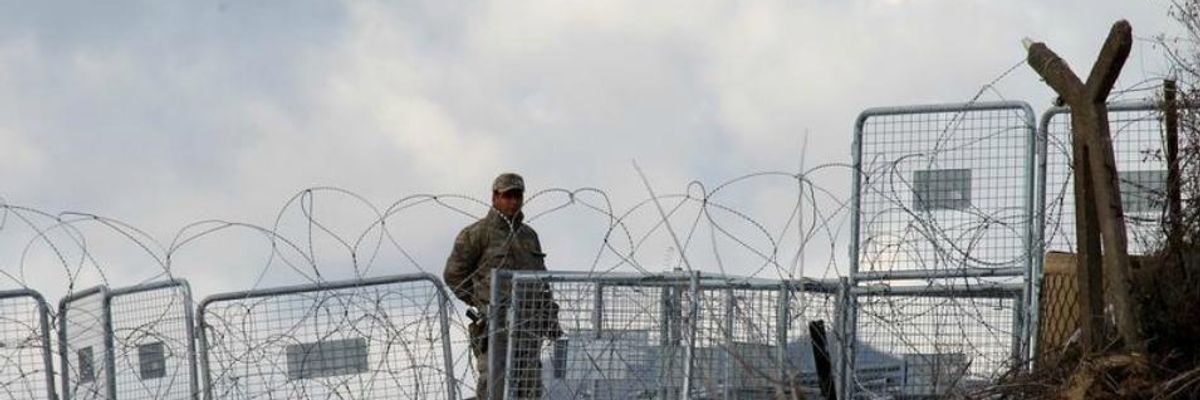Tensions continued ratcheting up along the Turkey-Syria border on Thursday, with Turkish Prime Minister Ahmet Davutoglu vowing retaliation in both Syria and Iraq for Wednesday's bombing in Ankara that killed dozens.
In a live televised speech, Davutoglu said Thursday--though he offered no evidence--that the perpetrator of the Ankara car bombing was a member of the Syrian Kurdish YPG militia, working with insurgents from the outlawed Kurdistan Workers Party (PKK).
Indeed, Turkey responded to the Ankara blast with airstrikes in northern Iraq Wednesday night, CNNreported, targeting the PKK that it says is affiliated with the YPG.
And the head of the Syrian Observatory for Human Rights, Rami Abdel has said that at least 500 Turkish fighters on Wednesday crossed the border and headed for the Syrian town of Azaz, in northern Aleppo province, where Sunni Arabs and the Syrian rebel groups Turkey views as "moderate" allies have suffered setbacks at the hands of Kurdish fighters.
According to the Guardian, these troops come on top of almost 350 fighters who were also reported to have passed through the Atme border crossing on Sunday armed with heavy and light weapons.
As Common Dreams reported Wednesday, Turkey has been talking openly this weekabout a ground incursion alongside forces from Saudi Arabia.
Deutsche Welle explained further: "While these military proposals are ostensibly to go after [the Islamic State] and protect refugees, Turkey's real motive is to check the Kurds. Importantly, the Turkish military itself has reportedly been the biggest check on the government's desire to enter the Syrian quagmire."
"Any intervention is complicated by Russia's air power in the Syrian skies and the falling out between Ankara and Moscow," DW added.
Meanwhile, the head of the Syrian Kurdish Democratic Union Party on Thursday denied that the YPG was to blame for Wednesday's bombing, suggesting Davutoglu and Turkish President Recep Tayyip Erdogan have other motives.
"We are completely refuting that," Saleh Muslim toldReuters by telephone. "Davutoglu is preparing for something else because they are shelling us as you know for the past week."
That sort of escalation, Muslim toldDW, could be catastrophic. "We believe the politics followed by Turkey are very dangerous for all the area, for Turkey, and all the Middle East," he said.
France 24 reports:
In an apparent reference to the United States, [Davutoglu] added that Turkey expects cooperation from its allies against the group. But Washington has worked closely with the Kurdish YPG in the fight against the Islamic State group in Syria. Ankara regards both the YPG and the outlawed Kurdistan Workers Party (PKK) as terrorist organisations; the US also lists the PKK as a terrorist group.
The Atlanticadds:
Davutoglu's comments reflect increasingly strained relations between Washington and Ankara, two longtime allies. Both the U.S. and Turkey believe the resolution to Syria's five-year-long civil war lies in removing the country's president, Bashar al-Assad, from power. Both sides arm and train Syrian rebels against Assad's government. And both are part of the broad coalition fighting the Islamic State. But while the U.S., like Turkey, lists the PKK as a terrorist organization, it has dismissed Turkey's requests that the U.S. cut off its support from the YPG, calling the group "an effective fighting force."
To make matters worse, in recent weeks, U.S.-backed YPG fighters have seized territory from Syrian rebels who are facing a major Syrian army offensive, supported by Russian airstrikes, near Aleppo, just south of the Turkish border. Turkey, fearful such action might stoke separatist sentiment among Turkish Kurds, has responded by firing artillery shells at the militia across the border. (In an interesting twist, Syria's representative to the United Nations said this week, after Turkey began shelling PYD positions in northern Syria, that the Syrian government supports PYD, too.)
As investigative journalist Robert Parry reports on Thursday, "the only person who probably can stop a Turkish-Saudi invasion is President Obama."
However, "I'm told that he has been unwilling to flatly prohibit such an intervention, though he has sought to calm Erdogan down and made clear that the U.S. military would not join the invasion," Parry writes.
"The dilemma for Obama is that many traditional U.S. allies, such as Turkey, Saudi Arabia and Qatar, have been the principal backers and funders of Sunni terror groups inside Syria, including Al Qaeda's Nusra Front and--to a lesser degree--the Islamic State," Parry explains. "Now, the 'allies' want the United States to risk a nuclear confrontation with Russia to, in effect, protect Al Qaeda."


